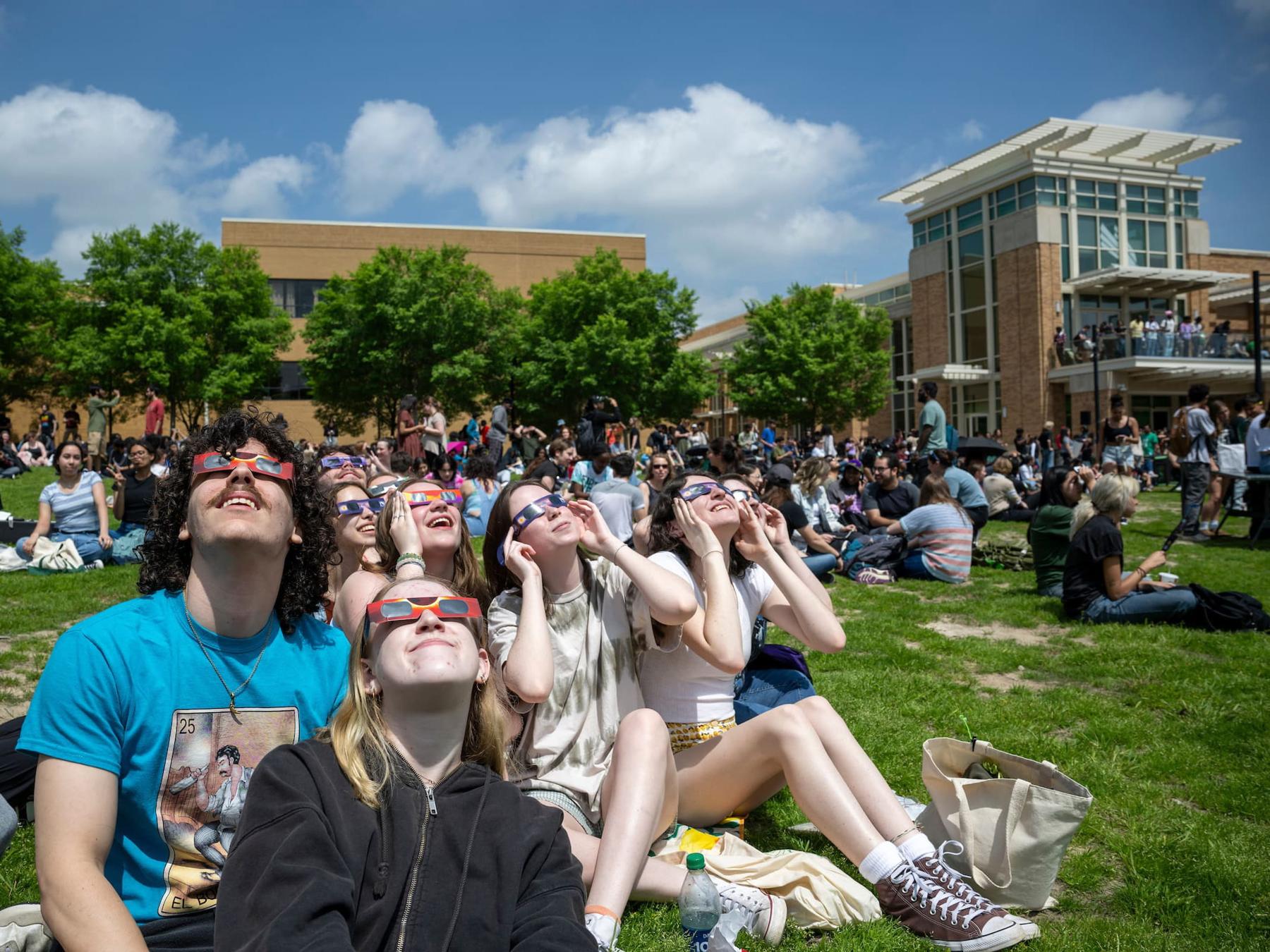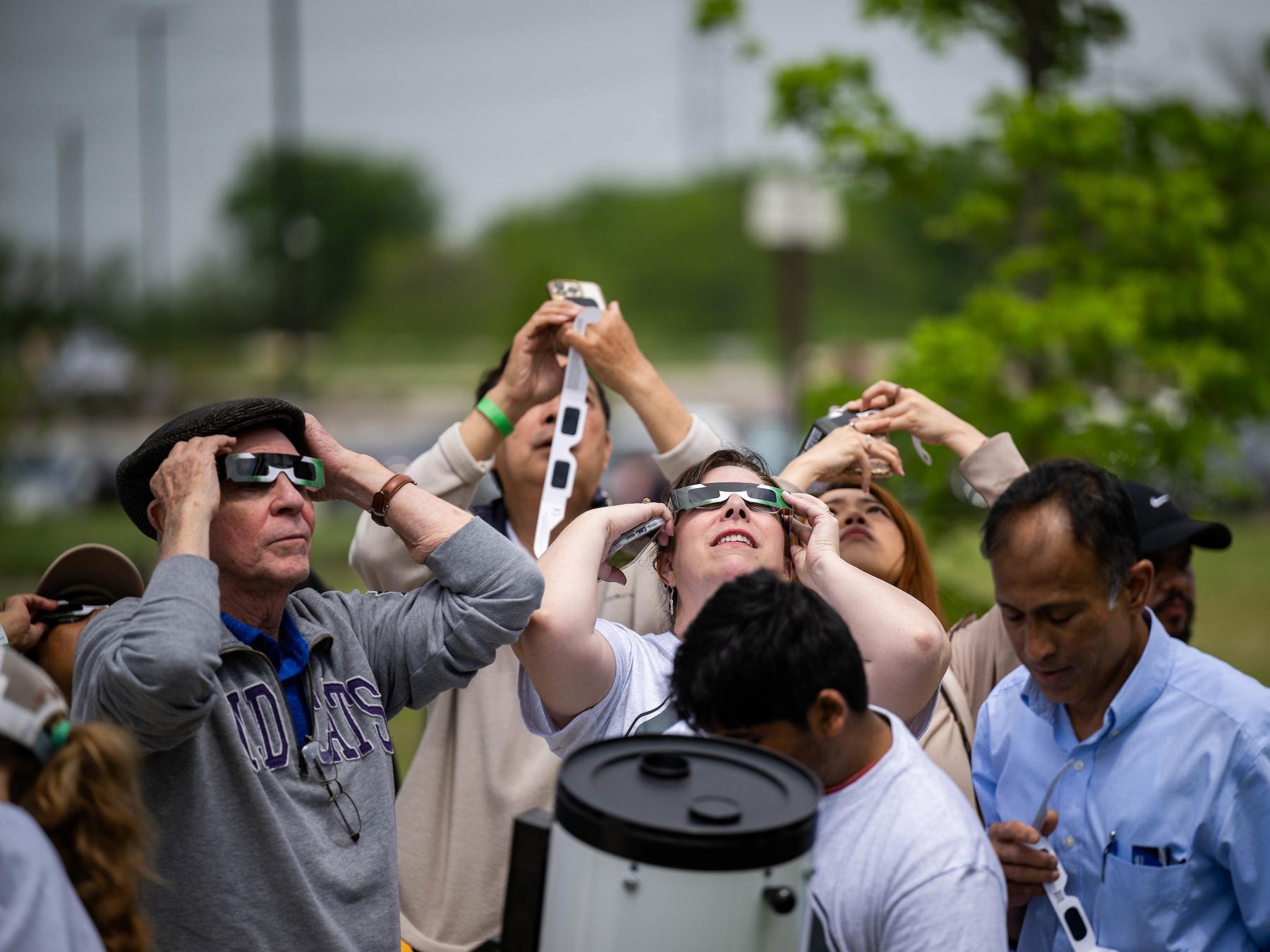
DENTON (UNT), Texas — The University of North Texas, alongside the entire nation, observed a monumental event as millions turned their eyes to the skies to witness the total solar eclipse.
Viewers gathered at UNT’s Denton campus and UNT at Frisco for events celebrating the celestial phenomenon. At the main campus and Discovery Park in Denton, students, faculty, staff and visitors were treated to a view of 99% totality.
“I’m thrilled so many people turned out today,” said Ryan Bennett, director of UNT’s astronomy education program, who emceed the UNT at Frisco event. “People traveled from other states to see this. They were engaged in science and the community. It was wonderful and a reminder of how special our planet is.”
At UNT’s Denton campus, the party resembled a festival on the University Union South Lawn. Many students chose to relax on blankets, munching on food and chatting with each other. Others hung out on the Union’s balcony. Songs such as “Walking on Sunshine” and “Talking to the Moon” blared from speakers.
“It’s very exciting to see everyone get together to see this moment,” said UNT freshman political science major Revka Gamero, who helped pass out glasses as part of the University Program Council, which sponsored the event.
Students cheered on the moon as it covered the sun just like those who set up at Discovery Park. Students there spread blankets on the grassy lawn close to the bus stop and enjoyed eclipse-themed snacks like Sun Chips, Capri Sun and Moon Pies.

“I came to Discovery Park because it seemed like the best place to watch everything,” said Autumn Erwin, a data science major. “It was reassuring for UNT to provide glasses for viewing because, as it turned out, I had unknowingly bought some that were counterfeit.”
At UNT at Frisco, visitors were treated to 100% totality, thanks to the branch campus’ advantageous location. Guests enjoyed jazz tunes on the back lawn, participated in eclipse trivia, listened to poetry readings and created their own pinhole cameras. At the height of the eclipse, the tower at UNT at Frisco powered on to softly illuminate the pink-and-purple twilight sky that emerged in the path of totality. The fleeting darkness drew cheers and applause from the crowd that gathered outside the Frisco Landing building.
“It was amazing,” said junior Arianna Michaud. “You could see the sun beams coming off the sun’s outline. It was really just amazing.”
A team from Pennsylvania State University and Lincoln University also used UNT at Frisco as their base for their part in the Nationwide Eclipse Ballooning Project. The team launched a weather balloon during the eclipse to study changes in the atmosphere during the celestial event. The Penn State team was one of 53 spread out across the country.
 “Our team is sending up multiple sensors today,” said Sven Bilen, an engineering professor
at Penn State. “We’ll be measuring air ions in the upper atmosphere and how an eclipse
can affect radio frequencies.”
“Our team is sending up multiple sensors today,” said Sven Bilen, an engineering professor
at Penn State. “We’ll be measuring air ions in the upper atmosphere and how an eclipse
can affect radio frequencies.”
The next solar eclipse to traverse the continental U.S. will occur in 2044. However, the subsequent one in Texas is projected to happen more than 200 years from now, making this Texas eclipse truly a once-in-a-lifetime experience.
Carol Foley, a Denton resident enrolled in courses at the Osher Lifelong Learning Institute at UNT, joined dozens of fellow members to view the eclipse at UNT at Frisco. The institute provides non-credit courses and educational opportunities for adults age 50 and better.
“It’s a once-in-a-lifetime thing,” Foley said. “Some people say it’s a spiritual experience. The eclipse gives us perspective on what life is all about.”